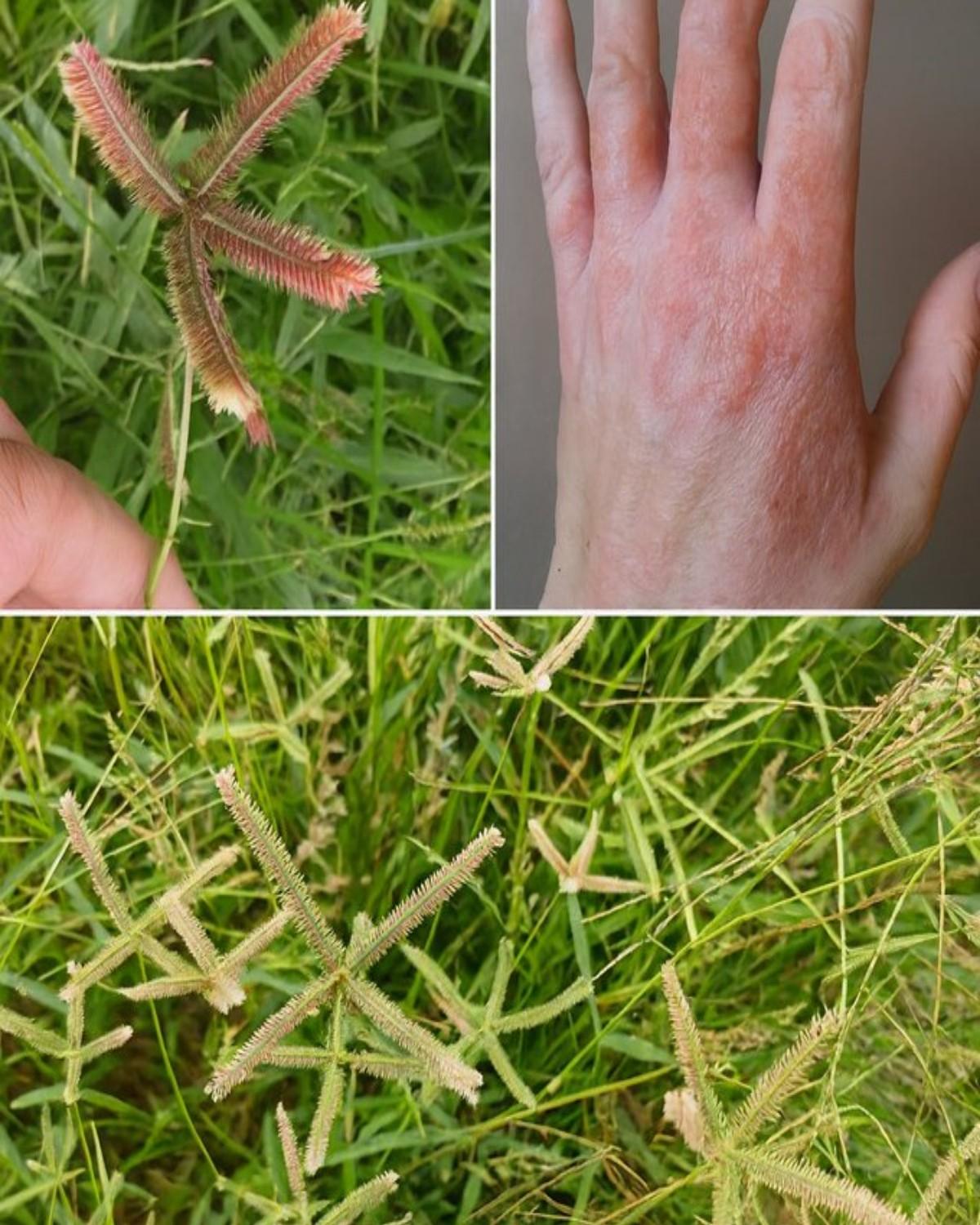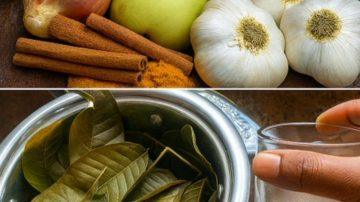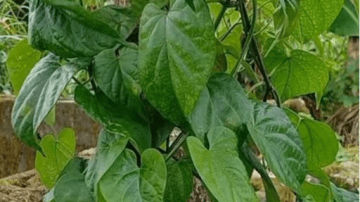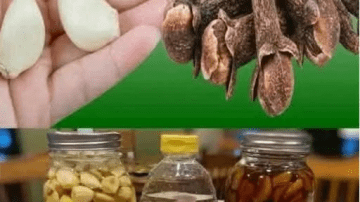Have you ever looked down at your lawn and dismissed those little green weeds growing between cracks and corners? You might want to think again. Because hidden among them could be one of nature’s most overlooked skin soothers—the humble Crowfoot Grass (Dactyloctenium aegyptium).

If you’ve struggled with red, itchy, irritated skin that never seems to calm down—no matter the cream or ointment—you know how frustrating it can be. Eczema, dryness, and inflammation can turn even the lightest touch into discomfort. But what if a natural, inexpensive plant growing right outside your window could help restore balance to your skin?
It sounds too simple, doesn’t it? Yet, this small wild grass may hold big potential. Recent studies suggest that Crowfoot Grass is rich in natural anti-inflammatory, antimicrobial, and antioxidant compounds—all of which your skin loves. And when used carefully, it could become your skin’s new best friend.
Let’s explore why this “weed” is quietly gaining attention in natural skincare circles—and how it might just become the most unexpected remedy in your self-care routine.
The Unseen Struggle: Eczema and Skin Sensitivity
If you live with eczema or recurring skin irritation, you know the cycle: dryness, itching, scratching, and more redness. It’s not just physical—it affects confidence and comfort, too.
Steroid creams and medicated lotions can offer relief, but they often come with side effects when used long-term. That’s why more people are turning toward nature’s pharmacy for gentler, plant-based alternatives.
And here’s where Crowfoot Grass, often pulled out as a “nuisance,” steps into the spotlight.
Meet Crowfoot Grass – Nature’s Quiet Healer
Crowfoot Grass grows abundantly in warm, tropical regions—often near sidewalks or open fields. Most gardeners overlook it, but herbalists in Asia and Africa have used it for generations to soothe burns, wounds, and skin inflammation.
The secret lies in its chemistry. The plant’s leaves and stems contain compounds that may reduce oxidative stress and fight microbes, both key in calming eczema and restoring skin integrity.
So how can this humble grass make such a difference? Let’s count down 7 fascinating benefits that explain why it’s earning a place in natural skin remedies.
7. Soothes Inflammation Naturally
When your skin flares up, your body is reacting to stress or imbalance. Crowfoot Grass contains bioactive compounds that may help reduce inflammatory responses at the surface level.
Applying freshly crushed leaves feels instantly cooling—like a light herbal compress that eases irritation. People describe it as a “relief you can feel within minutes.”
But the benefits don’t stop there—because soothing is just the beginning.

6. Calms Redness and Burning Sensations
If eczema or rashes cause redness, Crowfoot Grass juice could help tone it down. The cooling, watery extract provides a mild astringent effect that reduces swelling while refreshing the skin.
Imagine stepping out into a breeze after a hot summer day—that’s the sensation many users report after application.
And while cooling is pleasant, there’s something even more valuable this grass provides…
5. Hydrates and Softens Dry Skin
Dry, scaly patches are common with eczema. Crowfoot Grass’s natural juice helps replenish lost moisture without clogging pores or leaving a greasy film.
When used twice a day, it can make the skin feel smoother and more supple, creating an environment that supports natural repair.
This might explain why herbalists often describe it as a “skin drink” rather than a treatment.
4. Protects Against Bacterial Growth
One hidden danger of eczema is secondary infection—scratching opens tiny wounds, making it easy for bacteria to enter.
Here’s where Crowfoot Grass’s antimicrobial properties come in. Studies suggest that its extract may inhibit common bacteria responsible for skin irritation, helping prevent further inflammation.
It’s not a substitute for medication—but as a natural aid, it might support the skin’s defenses while you heal.
3. Supports Faster Skin Recovery
The antioxidant compounds in Crowfoot Grass—like flavonoids and phenolic acids—help protect skin cells from oxidative damage. This can speed up the repair of minor wounds or scratches.
Over time, consistent use may encourage a healthier skin barrier, reducing the recurrence of flare-ups.
And just when you think it can’t get better, there’s another layer of benefit waiting to unfold.
2. Reduces Itching and Discomfort
If you’ve ever been awake at night, unable to stop scratching, you know how draining eczema can be. Crowfoot Grass extract’s cooling and anti-inflammatory nature offers gentle relief from that urge to itch.
The sensation is soothing, almost like pressing a cool compress against irritated skin. Many users find this simple ritual helps them sleep better and scratch less.
But the final benefit might surprise you—it’s about what happens beneath the surface.
1. May Strengthen Skin’s Natural Barrier
Healthy skin acts like a shield—keeping moisture in and irritants out. Repeated inflammation weakens this barrier, but antioxidants and plant-based compounds from Crowfoot Grass may support its repair.
With regular application, your skin can begin feeling less reactive, more resilient, and better equipped to protect itself naturally.
That’s not magic—it’s biology meeting nature.
Case Study #1: Linda’s Calm Return
Linda, 45, had battled eczema since her twenties. Creams worked temporarily, but flare-ups always returned. On a trip to Sri Lanka, she watched locals crush green leaves and apply them to insect bites. Curious, she tried it on her wrist eczema.
Within a week, she noticed less redness and fewer flare-ups. “It wasn’t instant,” she said, “but it felt like my skin was finally breathing again.”
Her discovery? The leaf they used was none other than Crowfoot Grass.
Case Study #2: Michael’s Backyard Breakthrough
Michael, 52, was a gardener with sensitive skin. Every summer, he developed small rashes on his forearms. One day, after accidentally brushing crushed Crowfoot Grass against his skin, he noticed an unusual calm—no itching, no redness.
Intrigued, he began applying the leaf juice daily. “It’s the first summer I didn’t hide my arms,” he shared. Sometimes, nature gives solutions right under our feet.
How to Use Crowfoot Grass Safely at Home
If you want to try it, here’s how to do it the traditional way.
Preparation & Application Guide
| Step | What to Do | Why It Works |
|---|---|---|
| 1 | Collect fresh Crowfoot Grass leaves. | The fresher, the higher the active compounds. |
| 2 | Wash thoroughly under clean water. | Removes dirt or contaminants. |
| 3 | Crush or blend into a green paste. | Releases the cooling juice. |
| 4 | Apply gently to affected skin. | Soothes redness and itching. |
| 5 | Leave on for 20 minutes, rinse lightly. | Allows absorption without residue. |
| 6 | Repeat twice daily for 7–10 days. | Builds consistent improvement. |
Safety Tips
- Always do a patch test first—especially if your skin is sensitive.
- Avoid applying to open wounds or raw eczema patches.
- Store leftover juice in a clean glass container, refrigerated for one day only.
- Stop use if irritation worsens.

Comparison Table: Crowfoot Grass vs. Conventional Soothing Creams
| Feature | Crowfoot Grass | Commercial Creams |
|---|---|---|
| Source | 100% natural plant | Synthetic ingredients |
| Key Benefit | Cooling, anti-inflammatory | Fast moisture barrier repair |
| Cost | Practically free | Moderate to high |
| Side Effects | Rare (if patch tested) | Possible irritation or rebound |
| Sustainability | Eco-friendly, renewable | Depends on manufacturing |
Common Questions
Can I use it on children?
Yes, but only after consulting a pediatrician and performing a patch test.
Can I store the leaves long-term?
Dried leaves lose some potency. Fresh application is best for results.
Does it replace eczema medication?
No—it can be a complementary natural remedy but not a substitute for prescribed treatments.
When will I see results?
Many notice relief within 7–10 days of consistent use. Long-term skin improvement may take several weeks.

The Subtle Power of Simplicity
Sometimes, the best remedies aren’t found in expensive jars—they grow quietly in your backyard. Crowfoot Grass reminds us that nature often hides healing in the most unexpected places.
If you’re tired of harsh products and ready to reconnect with your body’s natural rhythm, this gentle green plant offers a refreshing alternative.
Start small. Try it for a week. Notice how your skin responds to the calm touch of nature.
Because healing isn’t always about doing more—it’s often about returning to what’s simple, pure, and alive.
This article is for informational purposes only and should not replace professional medical advice. Always consult your healthcare provider for personalized guidance.






